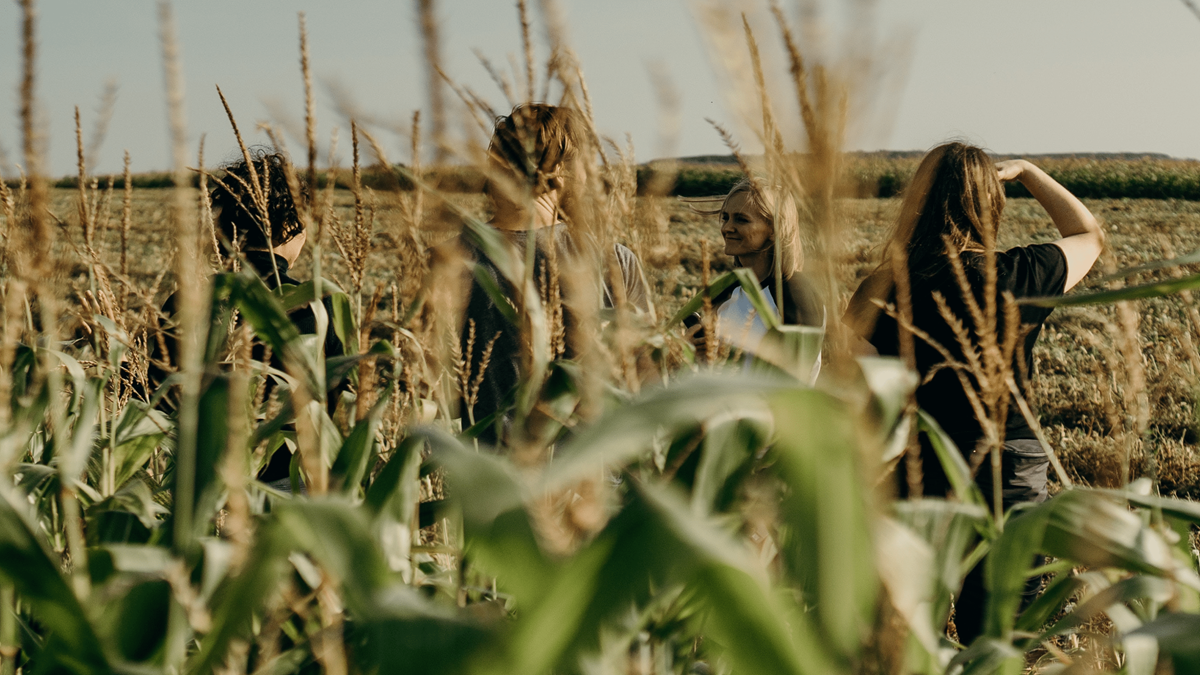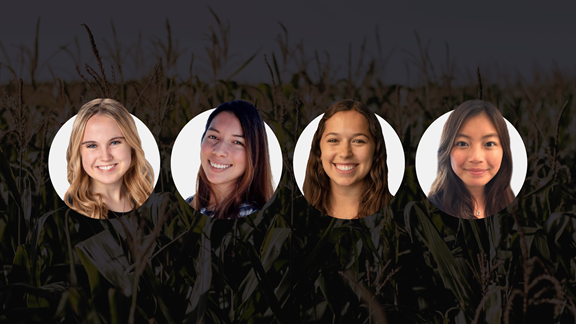Women succeeding in Agtech? You betcha!


Engineering and agriculture tend to be male-dominated industries, but at Kin + Carta, we’ve made a conscious effort to increase the number of female engineers at our company through our Inclusion, Diversity, Equity, and Awareness program. We are proud of the progress we’ve made as we work toward achieving gender equality.
Recently, four of our female software engineers who work in the agriculture industry sat down with Women in Agribusiness to discuss their careers in STEM. The full Q&A posted to Women in Agribusiness can be found below.

Annika Hall is a computer science graduate from Boston College, who is now based in Chicago, where she works with a large agriculture input provider. Laura Izquierdo, an aeronautical engineering graduate from UNEFA in Venezuela, is based in Mendoza-Argentina, where she works with a large agricultural business. In Chicago is Lily Roter, a computer science graduate from the University of Wisconsin-Madison, who has worked in the agtech industry for over three years. Tina Yue, a chemical engineering graduate of the University of Notre Dame, is based in New York City, where she is a technical lead focused on eCommerce and bringing digital awareness to a large agricultural business.
How did you get started in engineering?
Annika: When I graduated with my computer science degree in 2021, I wanted to get a job where I would have a lot of support and opportunities to upskill and train. I found that in the Kin Accelerator Program (KAP) at Kin + Carta. I'm so grateful for the experience and feel like I've already learned so much in my first year as a software engineer. I'm excited to continue learning more.
Tina: It started when I was applying to college. I have always been fascinated by technology and its power to affect everyone's day-to-day life. Ever since I was a little kid, I enjoyed computers and gadgets, and I would get excited opening one of these boxes and setting everything up. I always wanted to fix whatever was broken and improve the quality of things. That’s why I wanted to pursue engineering as my actual career – to make an impact on people's experiences and struggles with the modern world.
Lily: Growing up, I just loved puzzles and solving intricate problems, and I like approaching things from a logical and analytical framework. While I was in high school, a cousin who works in tech encouraged me to try an AP Computer Science class. I was lucky enough to take it, and everyone around me in the class was miserable and confused. But I loved it and went on to study Computer Science in college.
Laura: When I was 17 years old, I started studying engineering. After I received my bachelor's degree, I started working at a drone company, where I learned a lot about software and how drones were programmed. It was a whole new world for me that I truly enjoyed and prompted me to start studying software engineering. I’ve had my first opportunity here with Kin + Carta’s KAP program, and I’m very happy about it.
What do you like about working in the agriculture industry?
Annika: Agriculture is such an essential industry. To know that I'm improving an essential industry – though my impact may be small – feels very meaningful to me.
Tina: Agriculture has a huge impact on everyone's life by providing nutrients and crops – not just for people but for animals too. I also love how agriculture is not static; it's very dynamic. The industry always adapts to various elements that keep getting thrown at them, whether it's global warming, climate change, or a growing population.
Lily: The agriculture industry’s ultimate goal is to feed the world, and I think it's a really powerful space to work in. I have a lot of friends who show up to work every day, and they don't really feel as much meaning in their work. It’s very rewarding to see how our work in agriculture can help make people’s jobs easier and push technology forward to enable the future of agriculture.
What have been the most exciting parts of working in agriculture?
Tina: For me, it has been introducing digital experience to the industry; it's been both challenging and rewarding. Part of what makes agriculture so successful and special is all the research that has been put into it and how farmers apply that research to make the best decisions when growing their crops. Being able to give farmers a platform where they can view their data, make decisions and purchase things easily – that’s essential and exciting to be a part of.
Lily: I love the features and applications I've been able to work on, like using multiple machine learning models to identify plant threats or being able to estimate the yield of a corn ear for an entire field. It’s just very exciting to have these cool technologies to work with. And honestly, these are now party tricks that my friends are really into.
Laura: For me, there are two really exciting things about working with agriculture. One is that I’ve learned a lot about something that is part of our everyday lives, but we often don’t know anything about. Also, I’ve had the opportunity to help transform this industry into something more efficient with the help of technology.
What has it been like to work with other female engineers?
Annika: I've had some great female mentors on my team, and I appreciate their guidance. Their presence has made me feel like I do have a place in this industry, and there are ways for me to expand my career and develop and become a really experienced female engineer – and that's exciting. I hope I can be that for the woman engineers coming up after me as well.
Tina: It's great, though I wish there were more of us. We boost each other up a lot, especially since there are so few of us out there. I believe that each of us always gives value and leadership to our team, and we're not shy in doing so.
Lily: Yeah, it’s great. For my first project, I had the honor of joining two female engineers already on the project. Both of them soon became mentors and friends to me. They also were close in age to me, which was helpful. If you see a team full of male engineers, it's hard to envision yourself in that team and see yourself doing what they're doing.
Because of those women on my team, I was really able to see myself in them. They inspired me – I wanted to be just like them, and I could see what they brought to the teams and how I could do the same.
Now I’m starting to do mentoring myself, and it’s just really powerful work. If you can find other women in engineering and learn from each other and continue to lift each other up, that's how women run the world.
Annika: If you have the urge to explore engineering, you should try not to let the gender disparity discourage you. There are so many women here that want you to be here and are willing to help you get here. So even though there are some roadblocks, I think that being a woman in engineering, you have a lot of support from the females above you. Reach out to them and take advantage of their mentorship because there are opportunities for you here and we want you here.
Tina: My advice is that you're not starting from the beginning. There are many female mentors who have experienced much of what you’ll go through and can give advice. They’ll be a lot quicker in figuring out what works well and what doesn't work well. Also, believe in yourself and know everyone has an equal voice — not just men. Also, be confident. I'm more shy, so it was tough for me to get out of my comfort zone, but I did it. Know that now there are leadership opportunities and roles that are more women-focused, so just go for it and trust yourself.
Laura: I think there are so many myths about engineering careers for women. When you get there, you realize that they are only myths — that we can do whatever we want if we are willing to put in the effort. And here in my career, I have known so many great and amazing women who are not only engineers but also mothers, wives, and friends. Nothing in the career is an impediment to those things. And that's amazing. My advice would be: Don't be afraid. Just do it.
More from inside Kin + Carta?
Explore here.